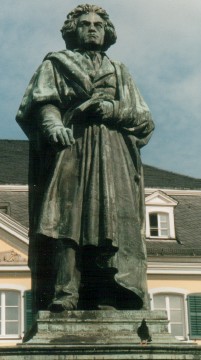|
William Gardiner 1771-1853


In / memory of / William Gardiner / (author of Sacred Melodies) / who died / November 16 1853
in the 84th year / of his age. / Also of / Sophia Gardiner / sister of the above
who died at Lowestoft / September 13 1864 / aged 78. / Also of / Anne Marie
relict of Andrew Douglas / who died at Leicester / November 4 1869.
William Gardiner’s love of music was with him since childhood. As a six-year old he had sung
a solo
at the wedding of one of his father’s friends and later learnt to play the piano and viola.
In his early teens, inspired by the return of the Militia from the American wars,
he wrote a march and a quickstep
for the band. Presented to the bandmaster, with no indication of the identity of the
composer, young William’s heart filled with pride as the band played his compositions
in the Market Place.
He is, however, best remembered for being instrumental in giving Leicester the privilege
of being the first place in England to hear the music of Beethoven.
In 1793, in the general flight from Bonn at the approach of the French Republican troops, the
Abbe Döbler, chaplain to the Elector of Cologne, accompanied Mrs Frances Bowater, the
daughter of the Earl of Faversham, to Hamburg. While at the Hanseatic port Döbler was
declared
an émigré, so Mrs Bowater invited him to accompany her to Leicester.
Döbler soon integrated himself into the musical life of the town and struck up a
friendship William Gardiner. Amongst the music that Döbler brought over in his
luggage was a copy of Beethoven’s Violin Trio in E flat, which he, Gardiner, and a member
of the Valentine family played one evening at the Bowater house
- three years before the work was published in London.
|
|
|
Gardiner’s admiration for Beethoven’s music was well-known and it was only just that in
August 1845 he was invited to the unveiling of the statue of the famous musician in Bonn.
Dr Walter, of that town’s university, spotted Gardiner in the crowd and called him to the
podium. Then, much to the Leicester man’s astonishment, he was invited to sign the parchment,
which recorded the date and facts of the inauguration and which was to be soldered
up in a lead box and deposited in the base of the statue.
The only place on the parchment that would accommodate Gardiner’s signature was
under the names of Victoria and Albert. As he often related, this was the proudest day of
his life.
|

|
Gardiner was also a devotee of the music of Hayden. In 1804 he had his hosiery
factory make six pairs of cotton stockings in which were worked various quotations
from composer’s music. Somehow the parcel of stockings got lost and
‘the god of science’ never received them.
William Gardiner was a member and one of the regular attenders at the Mechanics’ Institute’s
meetings. However, he always caused amusement, for at the close of every lecture, no matter what
the subject, he used to get to his feet and begin to speak, but hardly before he had opened
his mouth the audience would begin laughing. They knew just what he was going to say, for no
matter the subject of the talk Gardiner would
always ask a question relating to music.
Once he had got the lecturer’s eye Gardiner would try the patience
of the audience with the lengthy and desultory conversation that always
followed. He would try to bring music into everything and the story
goes that one day while walking across some fields with some friends,
one pointed to a man tossing up hay with a pitchfork and asked Gardiner
what he could make of that in music. Gardiner laconically replied,
"Oh he is simply sounding his A!"
In 1808 Gardiner published Sacred Melodies, a selection of passages from the works
of German composers such as Beethoven, Haydn and Mozart to which Gardiner had put the words of
psalms for use by chapel choirs. In 1832 he wrote Music of Nature and a few years later,
in 1836, published the first part of his autobiographical Music and Friends.
In August 1843 Gardiner was elected a Member of the Institute Historique de Paris.
This was a far cry from his first visit to France in 1802, when he had been deported for
expressing liberal views.
Gardiner was also well known for his ideas on acoustics, and often travelled great distances
to advise the builders of new concert halls. In 1850 he was called upon to go to Brighton to
advise on the best place for the organ in the Pavilion and, so it was said, the builders
of a new concert hall in Boston Massachusetts referred to his Music of Nature,
when they were constructing the building.
| |
